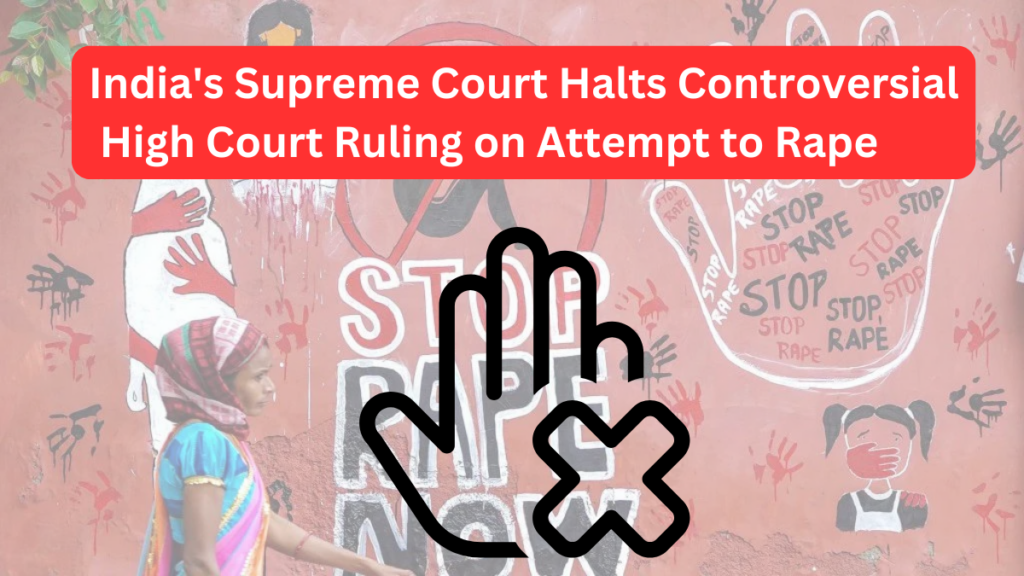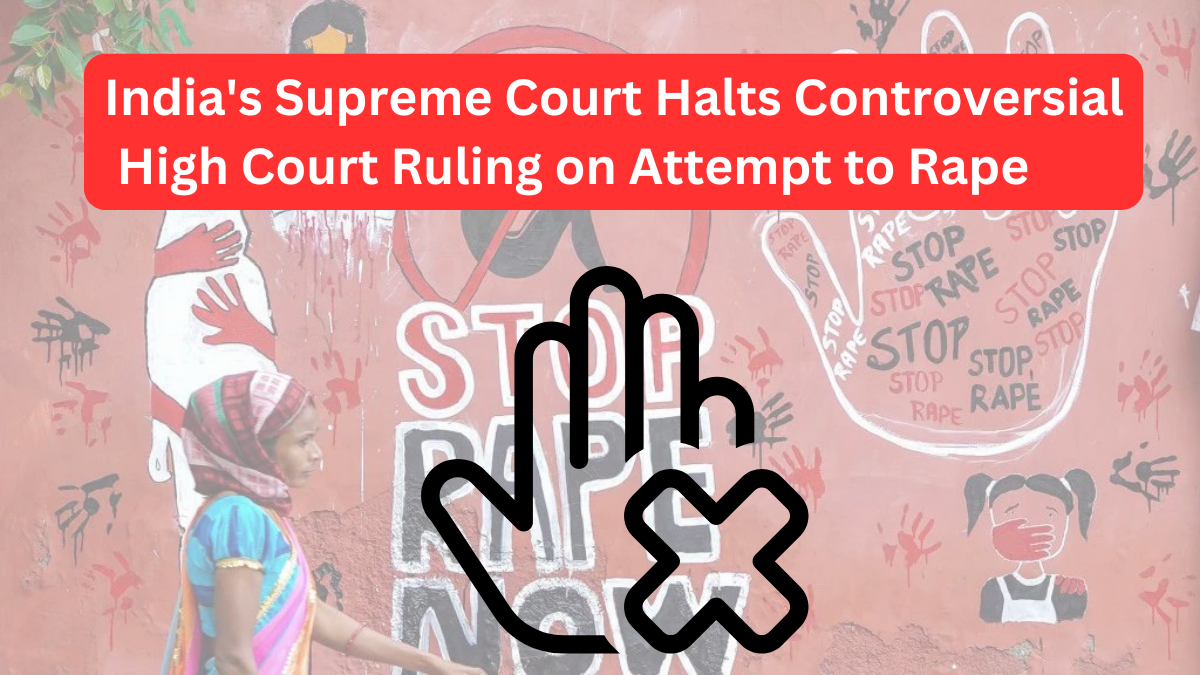India’s Supreme Court has temporarily halted a controversial ruling by the Allahabad High Court, which stated that “grabbing [the] breasts” of a minor girl and breaking the drawstrings of her lower garment could not be considered an attempt to rape.
This decision by the high court sparked nationwide outrage, with many criticizing it as insensitive and legally flawed. The ruling raised serious concerns about how courts interpret sexual assault laws in India, prompting intervention from the Supreme Court.

Supreme Court’s Response
The Supreme Court took swift action against the high court’s ruling, recognizing the potential implications of such a decision on similar cases in the future.
Key Points from the Supreme Court’s Response:
- A two-judge Supreme Court bench comprising Justice BR Gavai and Justice Augustine expressed deep concern over the ruling.
- The judges described the 17 March judgment as “shocking,” particularly because it was not made impulsively but after being reserved for four months.
- The top court has now issued notices to the central government and the Uttar Pradesh state government to seek clarification and review.
- The intervention highlights the judiciary’s responsibility to ensure that legal interpretations align with the principles of justice and victim protection.
The Case: What Happened?
The disturbing case involves an 11-year-old girl who was allegedly assaulted by two men from her village. According to the prosecution:
- The accused offered to give the girl a lift home on their motorcycle, gaining her mother’s trust.
- Instead of taking her home, they stopped midway and began assaulting her.
- One of the men grabbed her breasts and dragged her beneath a culvert, where he allegedly broke the drawstrings of her lower garment.
- The girl screamed for help, alerting passing villagers who intervened, forcing the attackers to flee.
- The accused denied the allegations, but the evidence and testimony of the victim played a crucial role in the case.
This case underscores the vulnerabilities faced by young girls and the need for stricter enforcement of laws to protect minors from sexual violence.
High Court’s Controversial Reasoning
The Allahabad High Court ruled that the actions of the accused did not amount to an “attempt to rape” but rather “aggravated sexual assault,” a lesser offence under the Protection of Children from Sexual Offences (POCSO) Act.
Key Points from the High Court’s Ruling:
- The court argued that “attempt to rape” requires evidence that the act went beyond mere preparation.
- It stated that there is a legal distinction between “preparation” and an “actual attempt.”
- The ruling implied that breaking the victim’s lower garment string was not sufficient evidence of an attempt to commit rape.
- The court maintained that while the assault was severe, it did not legally constitute an attempt to rape under Indian law.
Legal experts argue that such reasoning fails to consider the psychological trauma and fear inflicted on the victim. The decision also raises questions about how courts define intent in sexual assault cases.
Nationwide Outrage Over the Verdict
The judgment sparked immediate backlash across India. Many activists, legal experts, and government officials condemned the ruling for downplaying the severity of the crime and for setting a dangerous precedent.
Strong Reactions from Experts and Officials:
- Senior lawyer Indira Jaising stated that the assault “goes beyond preparation” and should legally be considered an attempt to rape.
- She explained that intent to commit rape is demonstrated by actions that precede the actual crime, such as isolating the victim in a secluded place.
- India’s Women and Child Welfare Minister, Annapurna Devi, criticized the ruling, calling it unacceptable in a civilized society. She warned that such judgments could have a negative impact on justice for sexual assault survivors.
- Women’s rights groups and child protection organizations have demanded a legal review to ensure that cases of child abuse receive the justice they deserve.
The Way Forward
With the Supreme Court stepping in, there is hope that justice will be served. The court’s intervention underscores the importance of handling sexual violence cases with sensitivity and legal precision.
What’s Next?
- The Supreme Court will review the Allahabad High Court’s ruling and decide whether it should be overturned.
- The government may consider legal reforms to clarify what constitutes an “attempt to rape” under Indian law.
- Women’s rights activists continue to call for stronger enforcement of laws to protect children and ensure stricter punishment for offenders.
This case has sparked a larger debate about the interpretation of sexual violence laws in India and the need for judicial sensitivity in such cases.
FAQs
1. Why did the Supreme Court intervene in this case? The Supreme Court found the Allahabad High Court’s ruling insensitive and legally questionable, prompting it to put the decision on hold. The ruling raised concerns that it could weaken legal protections for sexual assault victims.
2. What is the difference between “aggravated sexual assault” and “attempt to rape”?
- Aggravated sexual assault involves severe physical abuse but does not meet the legal threshold for an attempted rape charge.
- Attempt to rape requires clear intent and substantial steps taken toward committing the crime, which many legal experts believe were present in this case.
3. How did the public react to the high court’s ruling? The ruling caused nationwide outrage, with legal experts, activists, and government officials condemning it for undermining justice for sexual assault survivors. Many have called for judicial reforms to prevent similar misinterpretations in the future.
4. What actions has the government taken in response to this case? The central and Uttar Pradesh state governments have been issued notices by the Supreme Court. Further legal measures may be taken to prevent such judicial misinterpretations in the future. Activists and lawmakers are also pushing for reforms to strengthen child protection laws.
The Supreme Court’s intervention in this case highlights the need for a justice system that prioritizes the rights and dignity of survivors while ensuring that legal interpretations do not hinder the path to justice.
Click here to learn more
Pari is a passionate writer known for captivating stories that blend imagination and reality. Inspired by travel, history, and everyday moments, Pari crafts narratives that resonate deeply with readers.
